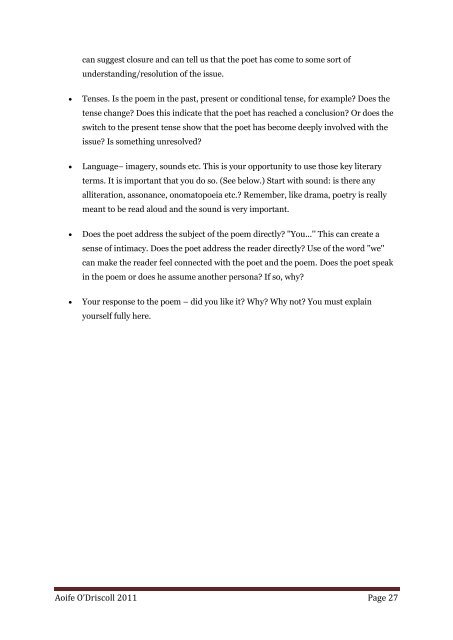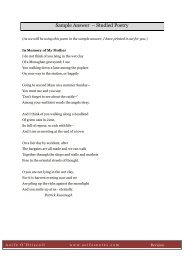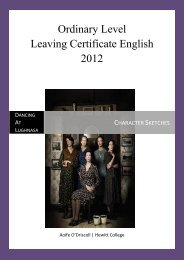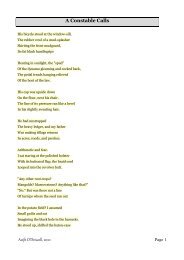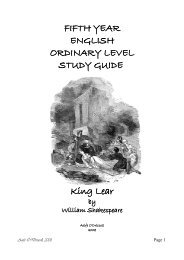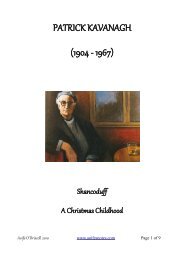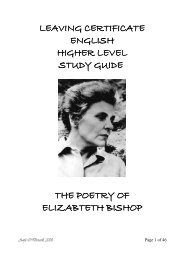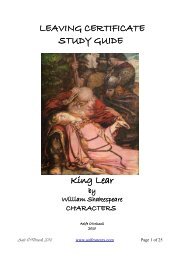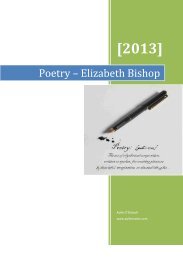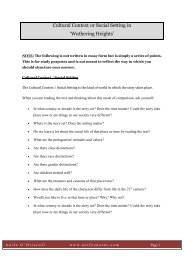Poetry - How to Write the Essay - Focus on Larkin - Aoife's Notes
Poetry - How to Write the Essay - Focus on Larkin - Aoife's Notes
Poetry - How to Write the Essay - Focus on Larkin - Aoife's Notes
Create successful ePaper yourself
Turn your PDF publications into a flip-book with our unique Google optimized e-Paper software.
can suggest closure and can tell us that <str<strong>on</strong>g>the</str<strong>on</strong>g> poet has come <str<strong>on</strong>g>to</str<strong>on</strong>g> some sort of<br />
understanding/resoluti<strong>on</strong> of <str<strong>on</strong>g>the</str<strong>on</strong>g> issue.<br />
Tenses. Is <str<strong>on</strong>g>the</str<strong>on</strong>g> poem in <str<strong>on</strong>g>the</str<strong>on</strong>g> past, present or c<strong>on</strong>diti<strong>on</strong>al tense, for example? Does <str<strong>on</strong>g>the</str<strong>on</strong>g><br />
tense change? Does this indicate that <str<strong>on</strong>g>the</str<strong>on</strong>g> poet has reached a c<strong>on</strong>clusi<strong>on</strong>? Or does <str<strong>on</strong>g>the</str<strong>on</strong>g><br />
switch <str<strong>on</strong>g>to</str<strong>on</strong>g> <str<strong>on</strong>g>the</str<strong>on</strong>g> present tense show that <str<strong>on</strong>g>the</str<strong>on</strong>g> poet has become deeply involved with <str<strong>on</strong>g>the</str<strong>on</strong>g><br />
issue? Is something unresolved?<br />
Language– imagery, sounds etc. This is your opportunity <str<strong>on</strong>g>to</str<strong>on</strong>g> use those key literary<br />
terms. It is important that you do so. (See below.) Start with sound: is <str<strong>on</strong>g>the</str<strong>on</strong>g>re any<br />
alliterati<strong>on</strong>, ass<strong>on</strong>ance, <strong>on</strong>oma<str<strong>on</strong>g>to</str<strong>on</strong>g>poeia etc.? Remember, like drama, poetry is really<br />
meant <str<strong>on</strong>g>to</str<strong>on</strong>g> be read aloud and <str<strong>on</strong>g>the</str<strong>on</strong>g> sound is very important.<br />
Does <str<strong>on</strong>g>the</str<strong>on</strong>g> poet address <str<strong>on</strong>g>the</str<strong>on</strong>g> subject of <str<strong>on</strong>g>the</str<strong>on</strong>g> poem directly? ''You...'' This can create a<br />
sense of intimacy. Does <str<strong>on</strong>g>the</str<strong>on</strong>g> poet address <str<strong>on</strong>g>the</str<strong>on</strong>g> reader directly? Use of <str<strong>on</strong>g>the</str<strong>on</strong>g> word ''we''<br />
can make <str<strong>on</strong>g>the</str<strong>on</strong>g> reader feel c<strong>on</strong>nected with <str<strong>on</strong>g>the</str<strong>on</strong>g> poet and <str<strong>on</strong>g>the</str<strong>on</strong>g> poem. Does <str<strong>on</strong>g>the</str<strong>on</strong>g> poet speak<br />
in <str<strong>on</strong>g>the</str<strong>on</strong>g> poem or does he assume ano<str<strong>on</strong>g>the</str<strong>on</strong>g>r pers<strong>on</strong>a? If so, why?<br />
Your resp<strong>on</strong>se <str<strong>on</strong>g>to</str<strong>on</strong>g> <str<strong>on</strong>g>the</str<strong>on</strong>g> poem – did you like it? Why? Why not? You must explain<br />
yourself fully here.<br />
Aoife O’Driscoll 2011 Page 27


